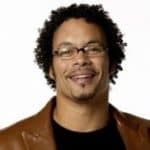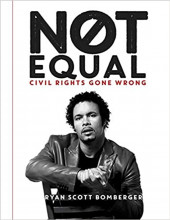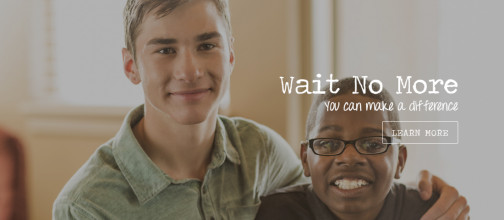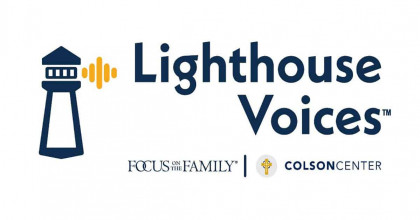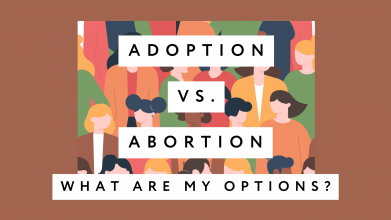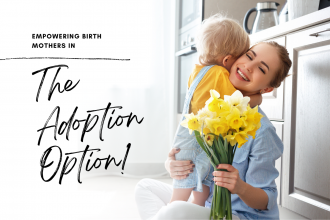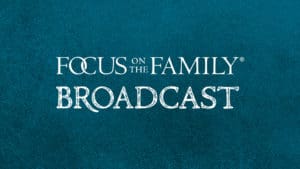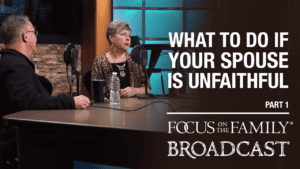Preview:
Ryan Bomberger: Literally if you look at evangelical and conservative, uh, protestant congregations, there are about 191,000 of them. If one family out of three of those, or if one family out of 33% of all of those evangelical and conservative churches adopted a child out of the foster care system, there would be no children waiting on that list.
End of Preview
John Fuller: That’s Ryan Bomberger and he’s our guest today on Focus on the Family. Uh, scripture tells us that when we act on behalf of the least of these, uh, it’s the same as if we were ministering to Christ himself. So we have a clear command to care for children, and we’ll be talking about that today as we observe November as National Adoption Month here in the US and in Canada.
Your host is Focus President and author Jim Daly, and I’m John Fuller.
Jim Daly: John, there’s over 400,000 children in foster care in the US. And of that number, about 120,000 that are available for adoption. That’s a big number.
John: It is.
Jim: State by state that 120,000, of course, is distributed into different states. And in Canada there’s about 30,000 children, uh, waiting to be adopted out of their system there. So it is an opportunity for Christians to actually do the work of God, to do His will and to take these children in and to be that forever family for them. And we’re gonna have that conversation with Ryan today, who has an amazing story of being adopted from foster care by a loving family. And, uh, he’s living proof of what God can do in the life of any human being who, uh, has given Him a chance to do that work in his life. So I’m excited about this discussion.
John: Yeah. And Ryan Bomberger is an Emmy Award winning creative professional. Um, he’s really gifted. He and his wife started the Radiance Foundation, which is a life affirming nonprofit organization. Uh, Ryan is a public speaker, an educator, a broadcast media designer, a producer, author-
Jim: (laughs)
John: … uh, he’s a dad-
Jim: I’m tired!
John: Yeah. I, I, I was just thinking. I’m- what am I doing?
Jim: (laughs)
John: I do radio. One thing. Uh, he’s written a book called Not Equal: Civil Rights Gone Wrong. And, uh, we’ll have details at the website. Uh, Ryan and his wife Bethany are the parents of four children, and two of those, uh, kids are adopted.
Jim: That is great. Ryan, welcome back to Focus.
Ryan: It’s great to be here.
Jim: Hey, um, I eluded to it, but you have lived it. So that’s- I don’t, you know, you’ve got the college degree. You’ve got a great, uh, you know, background. And John ticked off a number of accomplishments that you’ve had. But coming through and living through it to me is what gives you the greatest, um, bona fides (laughing), if I could say it that way, that we could have. Uh, you were conceived in a very difficult situation. Your mom decided not to abort you but to put you up for adoption. So for those that didn’t hear last time, uh, summarize that story for us.
Ryan: Yeah. So I’m that fringe example that we struggle with in this country and around the world when people talk about the issue of abortion, the inevitable question is well, what about rape? And I’m the tangible example of that and partly the answer to that. My birth mom experienced the horror and the violence of rape. She was a victim of the violence of rape but did not, as you said, make me a victim of the violence of abortion. And so she not only gave me the incredible gift of life but also gave me the incredible gift of adoption. And I was adopted into your typical American family-
Jim: (laughs)
Ryan: … of 15.
Jim: (laughs) Right, that’s the typical family. I love it.
Ryan: I- six brothers, six sisters. And 10 of us were adopted. And we’re all just all kinds of different hues, all kinds of different backgrounds, different stories. Most of us adopted out of the foster care system. And just loved. We were adopted and loved. That’s my story. As you mentioned I’m an adoptive father with four kiddos. And my wife and I are really passionate about advocating for adoption.
Jim: You know, you have thought about this a lot, obviously. You’ve written about it a lot. And even the way you connect the violence of rape and then the violence of abortion, um, it’s powerful coming from someone who is coming from the place you’ve come from. Even Christians back up on that one. And again, the number of abortions related to rape is very small. I mean, and that’s always what they trot out to defend abortion as a selective option, right, uh, for-
Ryan: Always.
Jim: … just to get rid of the baby ’cause it’s not where I wanna go right now to be a mother or a father. So speak to that Christian community particularly who should not back up on the issue of rape. Um, you’re living proof of that.
Ryan: Right. Abortion that results, um, because of rape related pregnancy is less than 1%. And the thing we have to remember, especially as Christians, is we’re all created in the image of God. Whether we were humanly planned or not. Whether we were conceived in violence or not. We are still made in the image of God. And none of us control the circumstances of our conception. I’m assuming you two didn’t (laughing) control the circumstances of your-
Jim: I was not in control then.
Ryan: … conception. Yeah, no. None of us have that kind of control. But yet we pretend that we can be the arbiters of human value. And so, for Christians we should have a very different perspective on that. And, and even with the cases of rape, we believe as Christians that every individual is redeemable. That Christ can redeem all of us. So even the rapist deserves redemption. But somehow when we talk about a child conceived in rape, those who are pro-abortion or pro-choice don’t really think about the child having worth and having value. And so hopefully I can be that tangible example of a life lived that shows the beauty of possibility.
Jim: Mm-hmm.
Ryan: And so as Christians we should really center on the fact that every human life, whether you’re planned or unplanned, has God given purpose.
Jim: Yeah. Um, let me go back to your family for just a second. I mean, with all those kids, were your adoptive parents, were they really able to show love the love of Christ to each one of you? Their biological kids and the adopted kids equally and all those kinds of things?
Ryan: Yeah, well, I was the favorite in the family. So I-
Jim: (laughs)
Ryan: … shattered that whole thing that biological-
Jim: And I’m sure each of the-
Ryan: … was favored so-
Jim: … each of you kids would say that, wouldn’t you? That’s good.
Ryan: I, I was the first one adopted. And, you know, each year it was a new, new flavor added to the family. And I will tell you, my parents never, whether in public or inside the home, never distinguished between the biological and the adopted children. They loved us all. I mean, they showed us time after time when, I mean, we faced instances of racism. Our parents would defend us. Out of our store- our family owns a, a retail store. And you would never know. I mean, my parents didn’t say, oh, that’s my adopted child. You didn’t- that’s not something you do. You don’t say that’s my adopted child, that’s my biological child. No, that’s my son. That’s my daughter. It’s the way that they lived their lives.
And some people think it was kind of chaos to have 13 kids. I don’t think so. Although I don’t know anything different. I didn’t grow up an only child. But they, they poured love into us. Their faith was real. Their faith was the same inside that home as it was outside of the home. My parents, Henry and Andrea Bomberger, because they loved Jesus, the natural outflow was loving people. And they loved us all.
And I just have to throw this out there. My father passed away a year from last January. So on the anniversary of Roe v. Wade, even.
Jim: Mm-hmm.
Ryan: And here’s a man who loved the Lord. And because of him, he’s the reason why I love being a husband, love being a father. Uh, he modeled integrity. He modeled love for Christ. And he is the reason why I’m the man I am today. And, um, my parents poured everything, everything into us.
Jim: Yeah. In addition, I mean, some of your- a couple of your siblings are special needs, correct?
Ryan: Yes.
Jim: I mean, that- that to me is amazing. That is an incredible act of love to adopt special needs children.
Ryan: Yup.
Jim: Shouldn’t be. Should be kinda like, yeah, they’re equal to us. And they need help. They need care. Um, where are they today, those two?
Ryan: Well, actually, there are more than two.
Jim: Okay.
Ryan: There are differing needs. Some have physical disabilities. Two of my brothers were born with albinism. So they have legal blindness. And so there are varying levels of that. One brother, who is albino, can drive and the other one can’t, although that was always strange to me ’cause they always had to watch the TV about this close. (laughing)
Jim: Oh man.
Ryan: I’m like, “How are you driving?”
Jim: (laughs)
Ryan: But, uh, others had some learning disabilities. Others had some physical disabilities, some deformations and had to have multiple surgeries. So there are a handful of differing special needs.
Jim: Yeah.
Ryan: But my parents- I mean, this is the thing. When you look at life and you look at people through the lens of scripture, through the way that God would look at others, you don’t see them as lesser than.
Jim: Right.
Ryan: It’s a whole different thing. It changes the way that you respond to people and the way that you react to situations. And my parents just- I felt like they didn’t know any other way other than to pour their entire selves into each and every one of us to help us, you know, realize our own God given purpose.
Jim: Yeah.
Ryan: And so those siblings are- they’re married, they have children. Some are- my one brother who’s legally blind is a music ministry leader. I mean, there’s flourishing all over the place. And that’s what love does.
Jim: Yeah.
Ryan: It helps unleash that.
Jim: And it’s so, again, it’s such a, uh, wonderful thing. I mean, the blessings. I was thinking, you know, in tombstones they don’t, uh, talk about your vocation. You know, this man was a wonderful vice president.
Ryan: Right.
Jim: It basically is he was a great husband and a wonderful father.
Ryan: Right.
Jim: And the same for moms, right? Uh, and that’s the idea here.
Ryan: Far more important.
Jim: Far more important to invest in people than other things.
Ryan: Right.
Jim: But, uh, let’s cover some of the myths and misconceptions in adoption. I think that’ll be good. And then after we’ll talk about things people can do to get involved, which I think is critical.
Ryan: Mm-hmm.
Jim: Some of those myths include, uh, the thought that people just aren’t adopting children from the US. You know? That that’s not- we adopt from Africa. We adopt from China. Uh, some of those adoption areas are now getting really, uh, restrictive. So speak to the issue of adopting a child who was born here in the US out of foster care. Is that happening and in what numbers?
Ryan: Well, every orphan- orphan is worthy of love, of course. But that whole nonsense, that people aren’t adopting from the United States, well there- there are several issues here. One, there’s not a national reporting system that actually even tells us how many children are being adopted.
Jim: That’s amazing.
Ryan: That’s a problem. That-
Jim: Yeah.
Ryan: … stopped I believe in 1992. That’s a major problem ’cause we don’t have a full picture to understand. What we do have is the Department of Health and Human Services that puts out what’s called an AFCARs Report that tells us how many children are in foster care and how many are adopted. In 2020, which is the latest report, there were about 54,000 children adopted, still another 63, almost 64,000 waiting to be adopted by the end of the year. So we’re looking at- at least the National Council on Adoption said that there are about 110,000 adoptions, domestic adoptions, a year.
But there’s so much more than we can do. So much more that the church can do. Literally. If you look at, uh, evangelical and conservative, uh, protestant congregations. There are about 191,000 of them. If one family out of three of those, or if one family out of 33% of all of those-
Jim: Yeah
Ryan: … evangelical and conservative churches adopted a child out of the foster care system, there would be no children waiting on that list.
Jim: Yeah.
Ryan: That’s really how achievable it is. And yet there are many who have a lot of misconceptions that these children aren’t wanted, they’re not being adopted. But they are. Just there’s not involvement, I think, of God’s people.
Jim: Well, yeah. And one of the things right there, talk to your pastor. If you’re a pastor listening to this, think about how you can lift adoption up out of foster care, or wrap around care. We’re gonna get to some of those solutions as well. It’s called respite care.
Ryan: Mm-hmm.
Jim: But a couple can come alongside a couple that does adopt and provide some help to them. Um, those are all good ideas. You know, I really wanna give a shout out to Brady Boyd, who’s our pastor here at New Life Church. Because he and I had lunch when I was thinking of what Focus could do to get involved. And I talked to him. And it- he said, you know, Jim, if you do something, I think we could probably get 100 children adopted. It’s a big church. 12,000, 13,000.
Ryan: Right.
Jim: But he said I think we could probably get 100 kids adopted out of our congregation alone. And they did. They adopted 106 kids, I think the number was, at the end of the day. And, I mean, think- that’s one church.
Ryan: Right.
Jim: That’s awesome. I mean if all the churches could have that attitude, which would eventually lead to every available child being adopted-
Ryan: Yeah.
Jim: … by the Christian community, wouldn’t that be an amazing headline?
Ryan: It would be. And what a testament-
Jim: (laughs)
Ryan: … to, to the church. I mean, being God’s people. Taking care of widows and orphans. This is- this should be our DNA. It doesn’t mean that every parent has to be the adoptive parent or the foster parent. But like you said, wrap around services. There are many other ways that people can get involved in encouraging that culture-
Jim: Right.
Ryan: … of adoption.
Jim: And, you know, to your point of the numbers, that’s just, you know, every third church adopt one. And then those families get around that one.
Ryan: Yup.
Jim: I mean, that- that is really doable.
Ryan: I mean, that’s shifting culture right there.
Jim: It is.
Ryan: Yeah.
John: Ryan Bomberger is our guest today on Focus on the Family. Uh, he’s got a great book not about this particular topic specifically. But, uh, the book is called Not Equal: Civil Rights Gone Wrong. Um, it really tells some of the story that you’re hearing today. It promotes the idea that every life is sacred. Uh, you can get that book at our website. And, uh, we do wanna encourage you to consider getting involved in adoption or supporting others who adopt through foster care as Jim and Ryan have been, uh, speaking about. All the details are gonna be at focusonthefamily.com/broadcast. Or call 800-A-FAMILY.
Jim: You know, uh, Planned Parenthood has that abort over adoption agenda. That’s one of the things that I have, you know, really tried to stress. Is these people in the industry, the abortion industry, are financially motivated.
Ryan: Right.
Jim: It almost disqualifies them to be in the debate. Because they’re making money off of the killing of a child.
Ryan: Right.
Jim: Six, $700. And it’s that plain. And for them to be the ones in the center of the town square screaming about a woman’s rights and a child’s death, to me it disqualifies them because it’s all about the cash. And, uh, there’s no way around that for them. But speak to that dilemma that the abortion industry faces of trying to feign being for something when actually they’re, they’re raking in the dollars from it.
Ryan: Well they are. Planned Parenthood specifically demonizes adoption all the time. In fact, in their, um, tool for educators which was material that- to educate, you know, activists for them saying that adoption, it’s much more painful for a woman to, you know, relinquish her child for adoption, as they put it, relinquish a child for adoption, than to, um, terminate her unwanted pregnancy. I mean, this is an organization that touts itself as being pro-choice. But if you’re demonizing one of the (laughing) two alternatives to the violence of abortion, how pro-choice are you? And this is what they do. They demonize, uh, especially now, they demonize adoption, they demonize foster care. And all in this whole anti-racist rhetoric, by the way, saying that it’s racist to actually pull a Black child out of his or her culture. Well you’re ripping a child apart out of (laughing) his or her mother’s womb.
Jim: Right.
Ryan: That’s racist. I mean, Planned Parent touts itself, by the way, they call themselves an anti-racist organization. If you’re the leading killer of Black lives, how in the world are you an anti-racist organization? So here you’ve got, you know, an organization that killed over 345,000 human beings last year. They don’t make money on referrals for adoption. That’s not what rev- you know, generates their revenue. It’s abortion. That’s what generates the revenue. Of course they’re going to be anti-adoption.
Jim: I, I just wanna stress this point, uh, for a pregnant woman who’s looking at what shall I do? What can I do? And she goes to Planned Parenthood and they’re- she’s on the exam table. Their steering her toward the abortion. ‘Cause again, they’re gonna make six, $700 from that. They get zero for an adoption referral-
Ryan: Zero.
Jim: Zero. So that lack of incentive for them, it’s one of the things I’ve thought about. Can we incentivize a, an abortion clinic to pay for an adoption. I mean, what if we gave them $1200 for an adoption? And get, you know, if it’s all about the money, which I think it might be, um, it’d be interesting to see if they would take me up on that. I think I could find people to support that. And, uh, and we could save a life one by one.
But that’s the problem that they have.
Ryan: Right.
Jim: Is while she’s on that exam table, it’s all about how do we get her to commit to an abortion-
Ryan: Right.
Jim: … not an adoption?
Ryan: Right. That, that’s not in their financial interest. And we’ve seen that over and over again. Actually, the abortion industry and, and like-minded organizations came together years ago for something called the Adoption Network. And they said, “We’re gonna take the mantle of adoption.” And it’s dissolved within a year’s time. Because you can’t on one hand say this child has value, therefore we’re going to advocate for adoption, and in the other room literally tearing apart that child that doesn’t have value because of his or her wanted status.
So every time the abortion industry pretends that it actually is offering choice, I mean, it, it literally just disintegrates. So this is why I advocate for pregnancy centers. The 2700 pregnancy centers that don’t have any financial interest in any decision, whether the woman choose to abort or not. And that’s why we need to better equip them to advocate for adoption in these centers. And many of them do a great job. But they don’t get the half a billion dollars, taxpayer dollars, each year from the federal government (laughs) to do what they do. And that’s- I mean, their whole thing is so radically different. They’re transformational-
Jim: Yeah.
Ryan: … where the abortion industry and Planned Parenthoods are transactional as in the financial transactional sort of thing.
Jim: You know, in the Christian community, Ryan, I think, uh, given Dobbs, that court case that overturned Roe v. Wade, some Christians think, oh, okay, the battle’s over.
Ryan: (laughs)
Jim: It’s really, you know, become more complex because it’s now 50 states that have the right to make a decision for or against abortion, or limiting abortion. So the battlefront has gone from a federal level to a state level. And so Focus continues to fight those battles. Other Christian organizations are fighting that battle to get as many states as possible to restrict or eliminate abortion. And then we gotta step up.
But, um, did I paint that fairly, what we’re looking at and what are you seeing in a post Dobbs decision?
Ryan: Definitely. I’m, I’m grateful that the Supreme Court finally (laughs), you know, changed its supremely wrong decision in both Roe and Doe, which were decisions made on the same day. But they’re- yes, the concentration is in the state level, absolutely. And- but you still have on the federal level, you have President Biden, for instance, who is fighting tooth and nail to expand abortion, to protect abortion. In fact, they have a new website from the Department of Health and Human Services on reproductive rights and reproductive health. And not one mention of resources other than abortion.
Jim: Mm. Mm.
Ryan: So on the federal level, there’s so much misinformation and so much, um, destructive direction. But on the state level, you’ve got legislators who are doing what they were elected to do, pro-life legislators, and we’re seeing, I believe there are 13 states at this point, um, that have banned abortion, the violence of abortion. But it’s also on a local level. There are city councils who, for instance, award funding for Planned Parenthood or for abortion in the area. You’ve got states that wanna be abortion sanctuary states. So the church has to awaken.
Jim: Yeah.
Ryan: It’s way past time for them to pretend that, oh, this is a political issue. It is a moral and a spiritual issue. And if they don’t catch on to that and they don’t realize that-
Jim: Yeah.
Ryan: … we’re looking at still nearly a million aborted-
Jim: Yeah.
Ryan: In 2020 there were 930,000 innocent human lives destroyed by abortion.
Jim: Yeah.
Ryan: The church has to awaken. But it is on a state level. And as a Christian, for me it- it should be on the church level.
Jim: Yeah.
Ryan: That there are so many things the church can do to change our culture, to embrace, uh, a biblical perspective on life.
Jim: Yeah. Uh, Ryan, let me play an audio clip, uh, from some children who were adopted from foster care by loving Christian parents like you were.
Ryan: Mm-hmm.
Jim: Let me play the clip and get your reaction.
Speaker 4: Now that I look back on it, I know I would’ve ended up in Juvie or something like that. I guess I figured it was hopeless.
Speaker 5: You know, every day is just a survival day and being passed around and stuff from family to family, it’s like well, you know, not get too comfortable because, you know, you just gotta have to leave again. So it’s always when are- when, you know, when- today, when am I gonna go?
Speaker 6: When they came, they came with their stuff in plastic trash bags. So all they had were a few pairs of clothes and maybe a toy that they kept with them.
Speaker 4: Makes you kind feel like a dog ’cause you get, um, passed around. It’s about the same deal.
Speaker 5: The darkness is like a dark room or something. And they blindfold you and they spin you around and then they just stick you some place and you don’t know where you’re at or anything. And it’s a very dark room. And you have to learn how to survive and find your way around without hitting the walls.
Speaker 6: You’re with other people that don’t know God and they’re in the same dark room as you. But really you’re just trying to figure out how you can get out of that dark room. And you have no idea how to do it because you’re just a kid that doesn’t know anything. And then all of a sudden, someone walks in the room that you don’t know. But they’re- that person’s light. And that’s the only light in that room. And then the next thing you know you’re going with that person out of the room into this whole beautiful world where it’s light.
Jim: Pretty powerful descriptions.
Ryan: Yeah. It’s heartbreaking. And also encouraging. It’s all, all that stuff mixed up. (laughs)
Jim: Hm.
Ryan: There’s no reason that it- I mean, it’s, it’s painful that a child ever has to experience any of that. And that’s why, you know, you hear oftentimes people say well no one should ever have to face that kind of trauma. No one should have to face that kind of brokenness. Well, you know, we’re- humanity is broken in every way, shape and form. And yet God gives us the means to actually enable triumph to rise from tragedy. And so you heard that in that clip. I mean, there are moments of triumph.
But it- you know, you hear pro-abortion advocates say, well, that child shouldn’t have to go through that. They’d be better off dead. I don’t know if you remember Simone Biles, the world’s most decorated gymnast, who was a foster child herself, kind of said the same thing on Instagram — that a child shouldn’t have to go through that. I’m like, but you’re the- you’re the tangible example of the beauty of possibility, of rising above, having been adopted by your grandparents. And, and achieving incredible greatness. Not that we have to achieve anything to make us worthy. But these clips just remind me of why we need to be that light-
John: Hm.
Ryan: … for these kids who, I mean, no child- no child is ever equipped to navigate something like that.
Jim: No.
Ryan: I have friends who all their lives just move from one foster home to another foster home to another foster home. And yet, like I see them serving the Lord. It’s really incredible. In fact, friends of mine who live in Dallas, Texas, who- power couple, love the Lord, serving in ministry, but that was her story. She was the one who had the bag going from one family to the other, to the other, to the other.
Jim: Yeah. Well, Ryan, this has been so good. And I think the purpose has been to open the eyes of believers that are listening and viewing that possibly would look into this. Or they know somebody that might be the right couple to do this. The point being, when you hear those kids, wouldn’t it be nice that we didn’t have kids with those stories? That the Christian community, again, steps up and does what it needs to do. And, you know, thankfully Jean held me accountable to that. We’ve got a do this. And we’ve probably had 15 kids come through our home. And, uh, two sets of kids for quite a long time, three years in one case and a year in the other case. So, you know, we did it. And I would encourage you to consider doing it.
And there are a lot of different ways you can act. You can- the respite care we talked about. Um, people that study foster, foster adoption. It’s about five couples or five families that really are the meaningful help that a family needs to succeed in this. And that means giving them a weekend break, allowing them to do something other than the laundry from time to time (laughing). To do the laundry for them, do the shopping for them. Just tangible ways to take some of the load off of them. That’s respite care. And, uh, you know, that’s something we can all do actually. And I think the Christian community, what a great way to get connected to that adoption community by reaching out and helping them.
There’s so many more things that we have, uh, ideas for. And you can get those at the website. And John will give you those details.
John: Uh, yeah. The starting point is gonna be our website where you can learn all about Wait No More. Uh, that’s our program to come alongside and encourage foster adoption. Uh, the website is focusonthefamily.com/broadcast. Or give us a call. 800, the letter A, and the word family. 800-232-6459. And when you get in touch, be sure to ask about a suitcase bundle that we’re making available to these children. Uh, ask God what he would have you do to bless a child in foster care.
Now Jim, uh, we heard in one of those clips, uh, one of those, uh, children say their stuff was in a plastic trash bag. And what we’re trying to do is bring some dignity to those children with this special suitcase bundle.
Jim: Yeah. In fact it, it includes a age-appropriate bible, a little teddy bear, and that suitcase, uh, just to demonstrate that we care about you. In addition, there’s a handwritten note from staff here at Focus that goes into every bundle to that child. And, you know, it’s just again a way to show them dignity. And people can definitely support that. And I think we’ve given away now four or 5000 suitcases through, uh, the adoption agencies. We make them the heroes. And, uh, we just wanna continue to do that. So join us in that desire to show these kids some dignity.
John: Call and donate if you can. Uh, a $100 gift will enable us to send a brand-new suitcase, an age-appropriate bible, a stuffed animal and a handwritten note to these, uh, children in foster care. All the details are gonna be at focusonthefamily.com/broadcast. Or call 800-A-FAMILY.
And again, uh, stop by our website. There are so many ideas for you to be able to get involved. And we also have Ryan’s book there as well.
On behalf of Jim Daly and the entire team here, thanks for joining us today for Focus on the Family. I’m John Fuller inviting you back as we once again help you and your family thrive in Christ.











